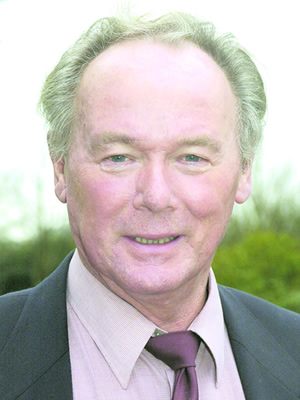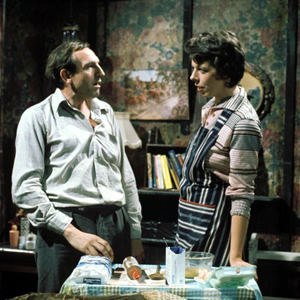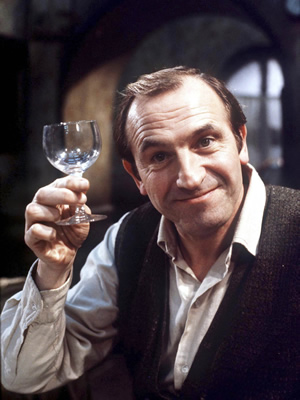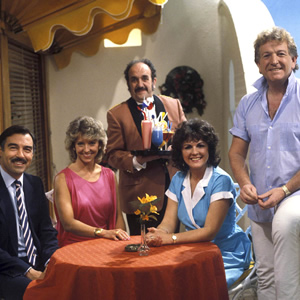Interview with Rising Damp writer Eric Chappell

He's credited with writing a television masterpiece, a comedy loved by viewers and critics in equal measure - yet Eric Chappell may never have created Rising Damp had it not been for his wife and the boredom she expressed when reading his terrible novels.
"They really were bad," Chappell winces, "and my wife Muriel used to yawn as she read them."
Confidence battered by yet another publisher's rejection, the young Chappell pledged to change tack: "I got the brainwave of writing plays instead."
"Mrs Chappell read these too," he smiles, "and immediately saw the improvement." In fact, his second attempt, The Banana Box, was so good it transferred to London's West End in 1973 - and would later become the TV sitcom, Rising Damp. Next week, the comedy returns to its theatrical roots with a UK tour.
Chappell may very well be ITV's most successful writer of situation comedy - other hits include Duty Free and Home To Roost - but it doesn't stop him feeling a tad nervous about the revival.
At least he doesn't have to play Rigsby. That challenge will fall to Stephen Chapman, taking on the role made famous by Leonard Rossiter, who died in 1984. Twenty-two of the 28 episodes made of Rising Damp featured Richard Beckinsale, who was already well-known on television, but the show catapulted Rossiter into the big league.
Cast as Rigsby (or Rooskby as he was in the original play), Rossiter was already a much-admired stage actor and his astonishing energy, brilliant timing and powers of observation turned him into a household name. Comparisons are inevitable for whoever plays the role next, but Chappell is more worried about the re-writes he has sent and how they might be received by cast and director - namely Don Warrington, who played the original Philip, the 'African prince'.

Chappell met the actors (pictured) for the first time at the read-through recently. He had no hand in the casting but trusts the judgement of show producers Classic Comedy Productions, who have also worked on stage adaptations of shows including Birds Of A Feather and dinnerladies.
"Certainly you have to be a brave soul to take on these parts," Chappell says, "but I thought they were charming people. And I have seen Rigsby done by other actors - people who could do it in different ways and I've said to them, 'don't think of Len, think of the character'.
"Audiences are not stupid, they know it's the characters they're going to see, not the original actors."
Strictly speaking though, Beckinsale and Rossiter were not 'originals' themselves. Manfred Mann singer Paul Jones was cast as Alan in the West End run of The Banana Box while, two years earlier, the Rooksby part had been taken by Wilfred Brambell, shedding his Steptoe & Son skin, in the first ever staging of the play, at The Phoenix Theatre, Leicester. Chappell remembers Brambell doing reasonably well in the role, "though physically he was a very different actor to Len."
When the production fizzled out, The Banana Box went into storage for two years until it was picked up again, this time leading to a tour and then a West End run with Rossiter as the miserly landlord. Set in a bedsit boarding house in a late 1960s university town, it was not just about love, frustration and loss of youth but also asked questions of what it is to be British.
Although it only played at the Shaftesbury Avenue Apollo for four weeks, life was changing for Chappell, who by now had resigned from his job as an Electricity Board auditor in Grantham, Lincolnshire, and had given himself two years to make it. "I had a wife and two children to support and it was a gamble, but it wasn't much of a gamble because the job was badly paid."
Luckily, television executives had sat up and noted the Chappell trademark - finely drawn characters, strong plots and crackling dialogue.

Offers were suddenly on the table to make not one sitcom, but two. Yorkshire TV bought The Banana Box, with Rossiter firmly on board, and ATV said 'yes' to Chappell's series about office politics, The Squirrels, which has just been released on DVD.
And while we now remember Rising Damp as classic comedy, producers had a fair few knotty problems to resolve first - not least the name of the main character, and even the title of the show itself.
The dilemma came about following Rossiter's acclaimed stage performance as a Hitler-like character in Brecht's The Resistible Rise of Arturo Ui.
Chappell recalls: "We were going to call the show Rooksby on TV but Len had said in an interview 'If you liked Hitler then you're going to like this Rooksby'. But a real Mr Rooksby, who happened to be a landlord - and I think he was a Quaker as well - heard about it and said 'I can't face this'. We were told he was considering legal action unless we changed the name.
"And that's what we did. I literally went through the telephone book and wanted a name that sounded sleazy but was close to Rooksby."
Rigsby it was.
But that wouldn't do for a title, and a solution was only stumbled upon after Yorkshire TV pressed Chappell for a name just before filming started. He only said 'Rising Damp' as a joke but Rossiter loved it and his endorsement was enough.

Much has been written about Leonard Rossiter: genius, perfectionist, driven, difficult. Actor Christopher Strauli, who was drafted in for the 1980 film version following Beckinsale's death the previous year, says "Rossiter wanted me to play it like Richard would have done."
But, he adds, writing on his website, he didn't want to copy Beckinsale and wasn't able to anyway. He praises the rest of the creative team but says: "Mr Rossiter managed to make the whole experience one of the unhappiest of my whole career."
So what does Chappell remember of Rossiter?
Firstly, just how good he was. "Sensational", both on camera and in rehearsal, and utterly dedicated to achieving the very best he could offer, such that he was exhausted by the end of filming.
Even in rehearsals he gave it everything - "but a difficult guy to work for," Chappell recalls. "At the read-through we never had a laugh because he was in total control. He could be very beady and he was looking for things that were not working. Me as the writer, I was one of the first to be examined, then others as well.
"He took no prisoners but to be fair he was fiercely loyal to the show."
Chappell pinpoints an occasion when faced with simultaneously writing scripts for both Rising Damp and The Squirrels: "I'd got four shows to write in three weeks and on this one occasion I threw the pen down and said I'm not going to be able to finish it. They [Yorkshire TV] wanted to get other writers in and Len said, 'no, I agreed to do it with Eric as the writer'. So they listened to him and paid everybody to go on holiday for four weeks while I wrote the episodes."
That ability to deliver would sustain Chappell over a television career in which he created nine situation comedies for ITV, totalling 200 scripts in 20 years. Writing would normally start at home at 6 am, continuing for two or three hours before driving a few miles into Grantham town centre. There he would polish the scripts in a rented office above a firm of solicitors.

It was a production line that produced hit after hit - one or two were modest successes but many - like Home To Roost, Duty Free (pictured) and Only When I Laugh - enjoyed number one ratings with 18 million viewers regularly tuning in.
The scripts were bashed out on an Olympia typrewriter that would last 50 years, but as the typewriter grew older, Chappell sensed that the television landscape was shifting.
His final sitcom - the second series of Haggard, based on Michael Green's book and aired in 1992 - was given no chance, he says, as it was scheduled at "children's hour on a Saturday evening and it never did very well." TV was tiring of programmes like his, he says, and it became "easier and cheaper to make other sorts of shows."
So as game-shows and reality ruled, what would a comedy writer do for the next 20 years? Chappell's answer was to go back to the theatre. He has written 25 plays since 1993, which have consistently toured in the UK and abroad, as well as being performed by amateur companies up and down the country.
"As we speak, at any one time twenty to thirty people are learning my lines. I've always wanted to do more theatre and the success in TV has allowed me to do that."
Rising Damp, the national stage tour, opens at Blackpool Grand Theatre on 13th May and finishes in Richmond on 20th July. Find out more at www.RisingDampOnTour.com
Help us publish more great content by becoming a BCG Supporter. You'll be backing our mission to champion, celebrate and promote British comedy in all its forms: past, present and future.
We understand times are tough, but if you believe in the power of laughter we'd be honoured to have you join us. Advertising doesn't cover our costs, so every single donation matters and is put to good use. Thank you.
Love comedy? Find out more
